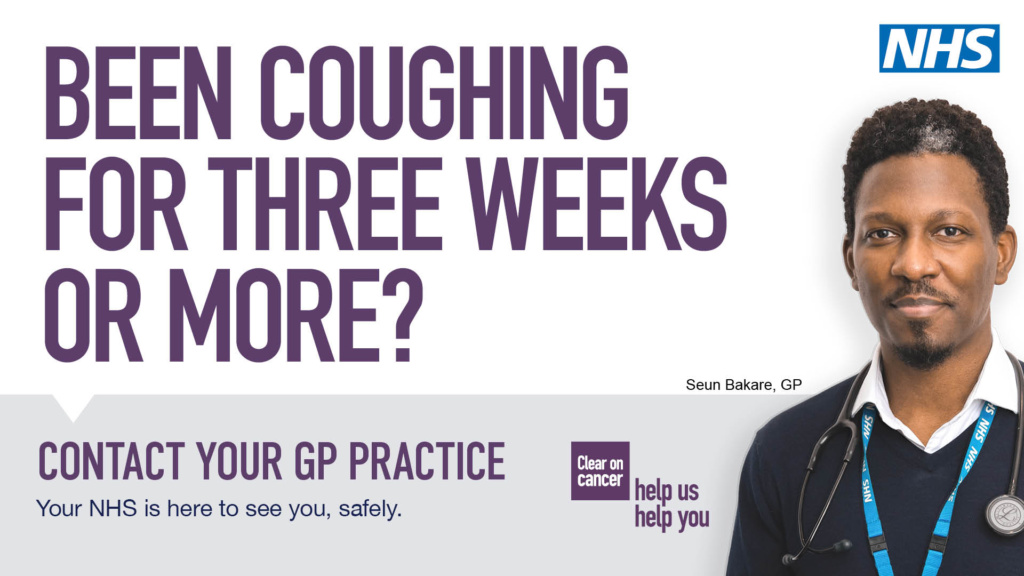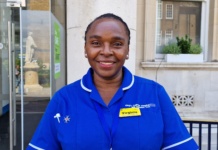
Sir Andrew Strauss, the ex-England cricket captain who lost his wife to lung cancer, has backed an NHS and Public Health England campaign urging people to get checked if they test negative for COVID-19 but have a cough that lasts for more than three weeks.
Sir Andrew has joined television presenter Gaby Roslin, who lost her mother to lung cancer, and others whose lives have been changed by the disease in a film warning not to leave it too late to get a check. Finding lung cancer early, like other cancers, makes it more treatable.
However, research commissioned by the NHS and Public Health England found almost half of people do not know that a persistent cough for more than three weeks can be a lung cancer symptom. And two thirds of people, 61%, would not make an appointment with their GP if they had a cough lasting three weeks or more and had tested negative for coronavirus.
The findings have been released as NHS England and Public Health England launch a major new drive encouraging people to get checked by a GP if they have lung cancer symptoms. In the poignant short film Sir Andrew, whose wife Ruth died aged 46, stressed that anyone coughing for three weeks or more should get checked.
Sir Andrew Strauss, Ex-England Cricket Captain and Founder of the Ruth Strauss Foundation, said: “This is a campaign very close to my heart after losing my wife, Ruth, to lung cancer in 2018. Lung cancer is a risk for everyone – Ruth had never smoked a cigarette in her life and was unbelievably fit and healthy. It’s so important that if you notice any loved ones showing symptoms that could be a sign of cancer that you encourage them to contact their GP practice.”
Around 39,300 people are diagnosed with lung cancer in England each year. Five-year survival for persons diagnosed with stage 1 lung cancer is 57% compared with just 3% for those diagnosed with late stage (stage 4) lung cancer.
Television, radio and podcast presenter, Gaby Roslin said: “I remember sitting there on the phone to the doctor and she said, ‘I’m afraid it is lung cancer’. Looking back on it my mum never told us how she was feeling, she was always making sure that we were all OK and making sure that my Dad was ok. If you catch it early it can make the biggest difference.”
The NHS Long Term Plan aims to increase the number of cancer patients diagnosed early, at stage one or two, from half to three quarters.
The health service has seen more people come forward for cancer checks since the first peak of the pandemicbut lung cancer referrals are at 73% of the same point last year.
Research found that the main reasons people gave for not contacting their GP were wanting to wait to see if symptoms would go away on their own (25%) and being worried about burdening the NHS (31%).
More than three-quarters (76%) of respondents said they would encourage their loved ones to make an appointment with their GP if they kept coughing but knew they did not have COVID-19. The Help Us Help You campaign includes a new TV advert which encourages anyone with an ongoing cough to not delay contacting their GP.
Dr Seun Bakare, a GP based in North West London, said: “Recognising the symptoms of lung cancer can be difficult. In the first instance, if you have a new, continuous cough it’s really important to get tested for COVID-19. If it isn’t COVID-19, it could be a warning sign for cancer so you should contact your GP – we are ready to see you safely.”
Dr Patience Ehilawa, specialist registrar in respiratory medicine at Sherwood Forest Hospitals NHS Foundation Trust said: “We know how fatal respiratory diseases can be so it is important to take note of any symptoms that could be of concern. If you or your loved one has had a cough for three weeks or more and it isn’t COVID-19, please speak to your GP practice. A persistent cough could be a sign of lung cancer or another respiratory disease. Finding lung cancer early makes it more treatable and saves lives.”
Dr Michael Beckles, Consultant Respiratory Physician, and former clinical lead for lung cancer at Royal Free London NHS Foundation Trust said: “We’re encouraging people, especially those aged over 60, to contact their GP practice if they’ve tested negative for COVID-19 but have a persistent cough for three weeks or more. No problem is too small, so please don’t put off contacting your GP practice. The NHS has adapted its services to ensure they can see you safely.”
From the start of the pandemic to December, 228,000 people started NHS treatment for cancer, 95% of whom did so within a month. Hospitals across England have also carried out more than two cancer procedures for every patient they treated for coronavirus in 2020. Despite this, latest figures show GP referrals for lung cancer remain lower than the same point last year.
NHS England has also introduced a series of innovations in cancer care during the pandemic, including COVID-19-secure surgery hubs that were set up across the country and £160 million invested in ‘COVID-19-friendly’ cancer drugs, that treat patients without having such a big impact on their immune system or offer other benefits such as fewer hospital visits.
Kindly follow us on twitter:@AfricanVoice2










